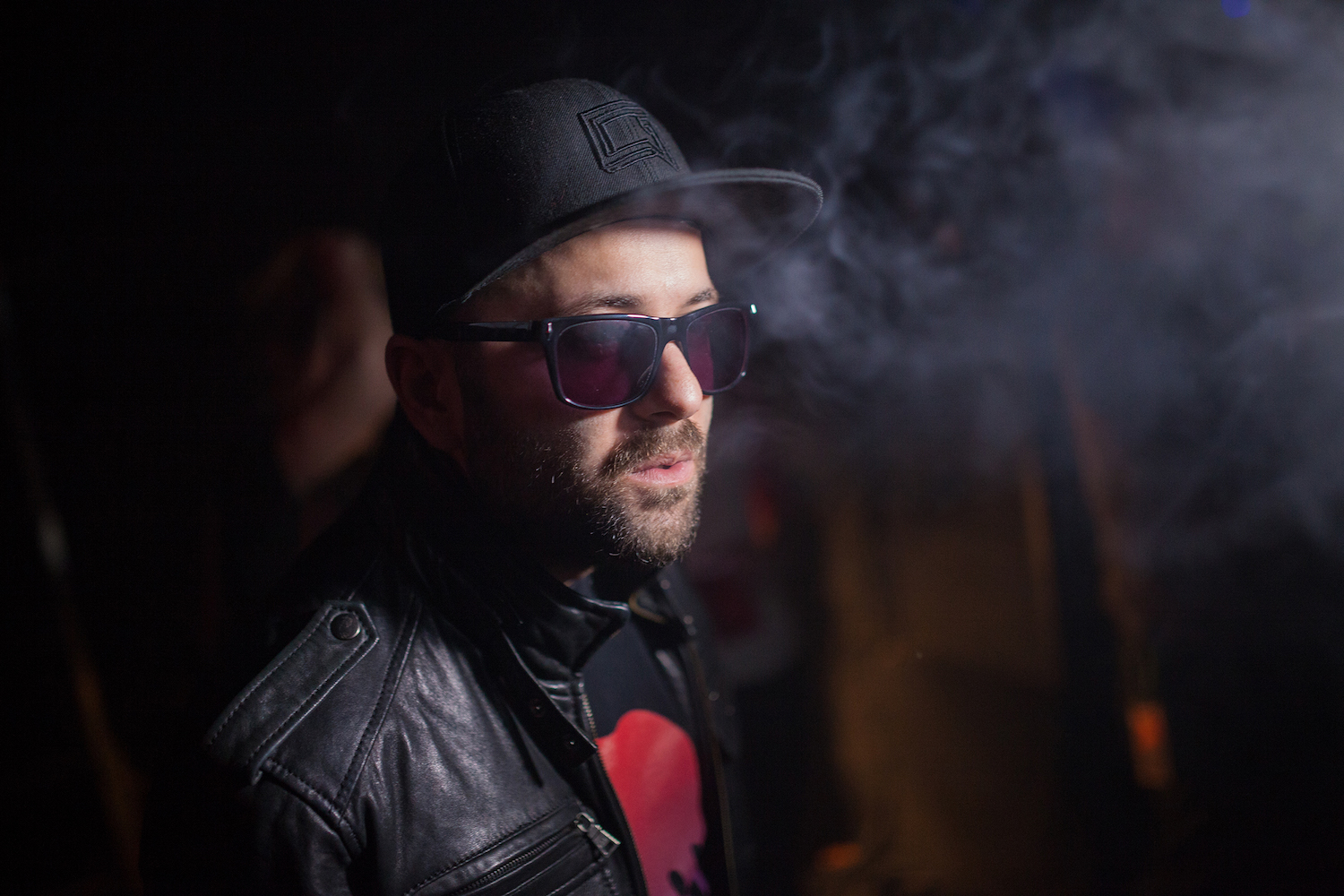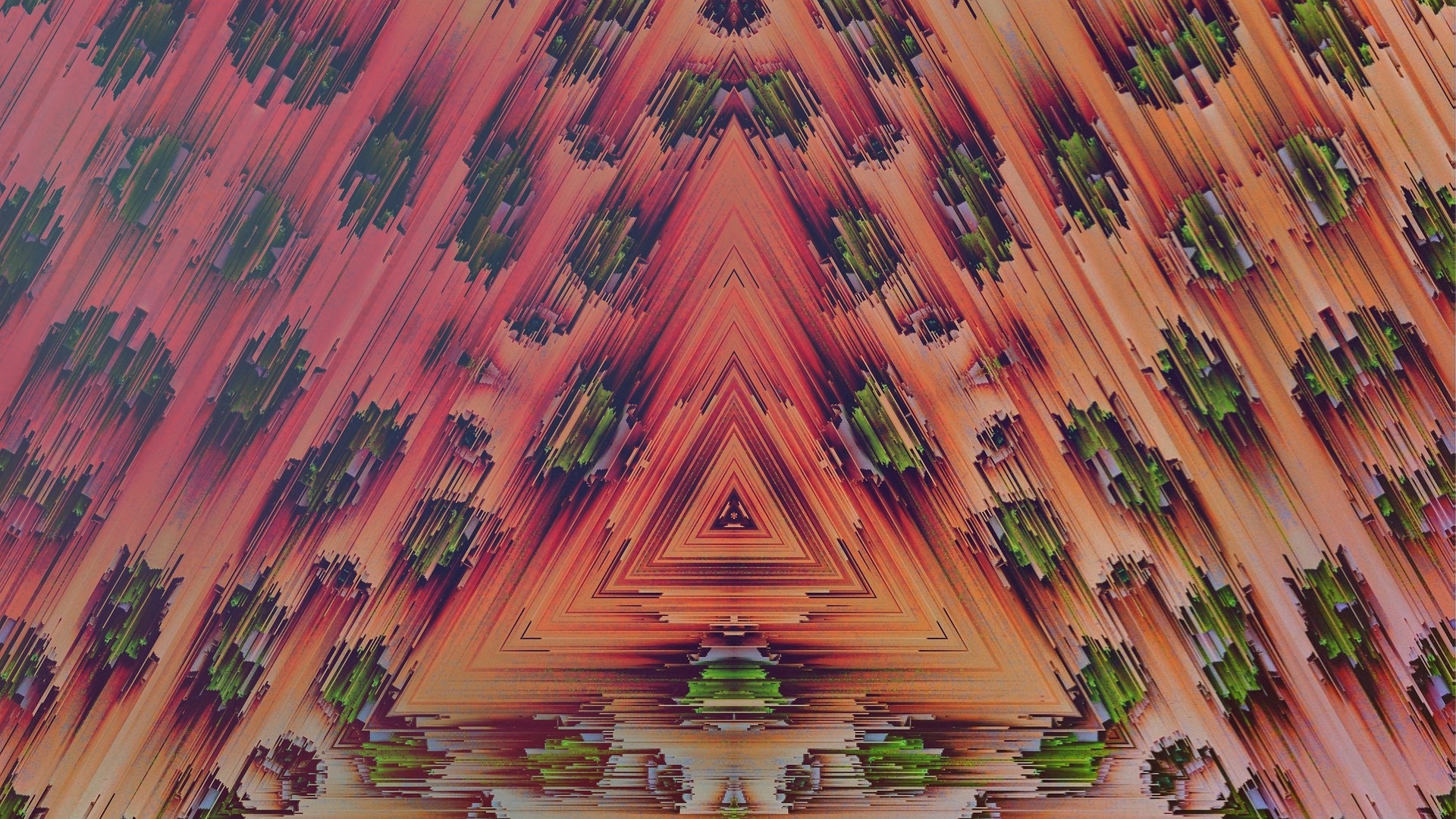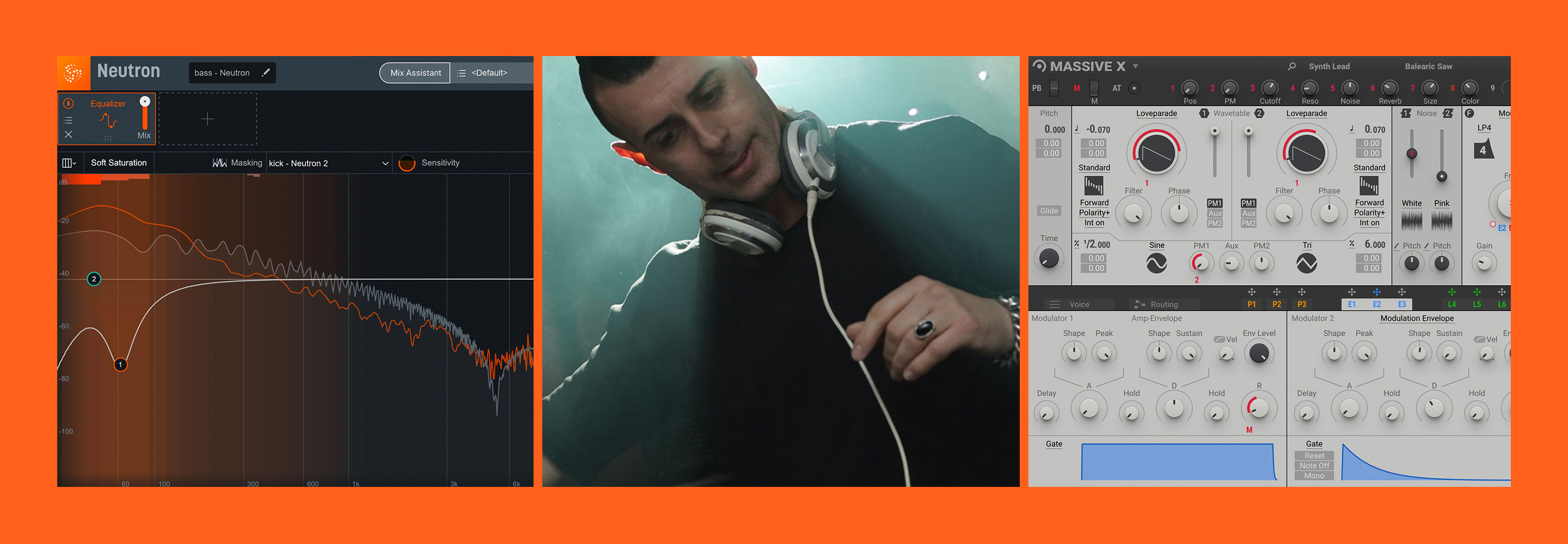
10 Questions with Electronic Music Producer Gramatik
In this interview, Gramatik reveals his recording setup, what plug-ins he relies on, and how he produces songs with live instrumentation in mind.
This article references previous versions of Ozone. Learn about the latest Ozone and its powerful new features like Master Rebalance, Low End Focus, and improved Tonal Balance Control by clicking here.
On Gramatik’s Facebook page he writes, “I'm a part-time musician and a full-time comedian, so never take my music seriously. It's just one of my many elaborate jokes.”
Despite Gramatik’s tongue-and-cheek request, since releasing his debut album in 2008, the New York City based music producer has cultivated a large mash-up of fans from electronic, hip-hop, and funk circles who gobble up his discography of free music and follow him to festivals across the world.
In this interview, Gramatik reveals his recording setup, what plug-ins he relies on, and how he produces songs with live instrumentation in mind.
Turns out, there’s a lot that goes into not taking music seriously.
“You aren’t making music to showcase your sound design or mixing skills; you’re making music because you want to make people feel something deeper.” —Gramatik
1. In a Mic.com interview, you talk about sampling recordings vs. sampling live instruments played by your friends. You said that while it’s harder to create a beat from live instruments, it can up the originality of the song. Can you give me an example of a song where you sampled live instruments, and why you made that decision?
A good example of that would be "Just Jammin' NYC." That tune was a result of sampling a thirty-five minute jam session that included guitar, bass, keys, and talkbox. I had my friends play over a drum loop I programmed, and then I spent about three or four days going through thirty-five minutes of each instrument channel, chopping out my favorite licks, rearranging them, warping them, and molding everything together into a new song.
It's usually a much more lengthy and exhausting process, but the end result is worth it. You end up with something really special that's also essentially an original composition. The main trick or goal is to make the final song sound like it was written and recorded exactly as the listener hears it while, in reality, it's anything but that. To me, that is the most gratifying part of the whole process.
2. In another interview you said the EDM scene is missing live instrumentation in performances. When you’re writing a song, do you think about how it will translate to a live performance? If you do, how does that affect your producing process?
I do, actually. Most of the time I consciously make sure the arrangements have a part that's perfect for a live instrumentalist to play over. If a song has a prominent guitar riff or a solo, I often export live versions without it, so whoever plays with me live can do those parts and have the freedom to put their own twist on it as well.
I also like producing new songs in ways that they fit with songs from previous albums in a live arrangement. I get really excited when I can beatmatch and keymatch three different songs from three different albums, have them constantly coming in and out of each other, and have the instrumentalist play the riff of the first song on the third song—almost confusing the audience into not being sure which one of the three well-known songs are they listening to at the moment.
“If I have to communicate with people verbally, I only do it through VocalSynth.”
3. Which iZotope plug-ins do you use, and how do you use them?
Oh man, do you have a week?
I've been a diehard fan since Vinyl. Beginning with my 2012 #digitalfreedom release, I've mastered all of my releases with Ozone Advanced; currently I don't even go take a leak without putting Ozone Maximizer on it first. I put Ozone Exciter into my morning coffee instead of sugar. Ozone Imager is literally my only friend, the only one who truly understands me and cares about my feelings.
And not to mention, I've been shamelessly cheating on FF Pro-Q 2 with the Neutron Equalizer lately, and I practically sleep with Neutron Transient Shaper now.
Oh and I almost forgot, if I have to communicate with people verbally, I only do it through VocalSynth.
But yeah, it's hard to find a channel in my session that's not being sent through an iZotope plug-in one way or another. My current master chain is Exciter, Neutron Equalizer, and Maximizer as separate units. I'm kind of obsessed with IRC IV Transient mode—the accuracy and transparency is fantastic. The first thing I do when I open a new Ableton session is put Ozone Imager on two return channels with different band settings and compression; anything that needs expanding goes through them. I love using the Vintage Limiter for vocal group tracks and synth group tracks right before the sidechain compression; it really gives a thick warmth to the overall sound of your main melodic elements in the song.
I've been using Neutron Compressor for parallel compression on return channels a lot lately. Even though you can adjust the mix amount on the plug-in itself, I still prefer to do it that way. I used to use Alloy 2 Transient for my kicks and snares but, as you know, Neutron Transient Shaper just blew it out of the water; it works ridiculously well and you can fine-tune every little detail on multiple bands.
Neutron Track Assistant and the way it can communicate with other instances of itself through all of the channels you put it on is still blowing my mind. I mean seriously, what the fuck guys?
RX is a whole other amazing universe of its own; you have no idea how many times I wished I could just remove the annoying loud headphones in the background of an otherwise perfect vocal take back in the day. Well, I'm sure iZotope programmers have a perfect idea actually, it's why they wielded it into existence for us mere mortals, so we can stop fucking complaining and do something useful with our meaningless existences!
4. For aspiring producers who are intimidated by the complexity of the music tech world (plug-ins, DAWs, etc.), what advice would you give to simplify music making?
The most important thing is still the song. Focus on the song, not the tech. Remember that you are not making music just to showcase your sound design or mixing skills—you are making music because you want to make people feel something deeper. You want people to have a captivating emotional response when they listen to your music, and only when you're sure you have that figured out should you focus on the technical parts of it.
And don't let the tech overshadow the song. Don't exaggerate just for the sake of using a lot of plug-ins—be rational and moderate. In EDM, people often tend to forget that the end goal is still, above all, making a song that has emotional meaning—a song that can transcend whatever is the current popular production trend, a song that can stand the test of time and make the fans want to revisit it over and over again because it has emotional value.
"I firmly believe collabs are the best way to get better at making music."

Photo by Patrick Hughes, courtesy of Gramatik
5. What’s your ideal producing environment?
My ideal producing environment is my bedroom studio. I love being at home for months on end, barely leaving the house, isolated from the outside world, wired in, taking breaks to watch movies and shows in the living room and give my ears a break. Then I go back in with a fresh perspective. It's really a dream life for me.
My setup is simple—most of it is in the box. I'm an Ableton guy, and I use all of the usual suspects like Native Instruments, Spectrasonics, Arturia, u-he, Xfer etc. I work primarily on Beyerdynamic DT770 Pro 250 ohm headphones and use Adam Audio monitors + sub for reference. I use a MOTU Track 16 and Apollo Twin Duo, I have a few midi keyboards, a Nord Electro 5d, a Neumann u87ai mic, a Banshee Talkbox and a bunch of other stuff. When I need any kind of high-end gear, or I need to record horn sections etc, I go to a few different studios around New York City that have some amazing gear and rooms.
6. What was it like working with Raekwon, ProbCause, Adrian Lau, and other artists on your latest album, Epigram?
For me, it's always an absolute pleasure working with other artists. It's one of the most exciting parts of the job. Rae, Prob, and Adrian are all rappers, and working with rappers is always fun and refreshing because they breathe new life into a song that obviously started out as an instrumental. I'm always really excited when I send them a beat to hear how will it inspire them and what it will make them write about—what kind of emotion the beat sparks in them.
It's a really special thing to me, even more so when I collaborate with other producers. You learn so much from working with other producers, not only from their unique production tricks and techniques but also from their perspective and perception of music and sound in general. It can be incredibly enlightening in so many ways, and I firmly believe collabs are by far the best way to get better at making music in every respect.
7. Who have you not collaborated with but want to, and why?
There are so many artists, man, but off the top of my head, I'd love to make a tune with Run The Jewels, ‘cause they are just crushing it right now. I like how their rap is lyrically flamboyant but at the same time socially and politically conscious. It's the perfect mixture for me, and the two of them go well together.
8. Your latest collaboration with GriZ as Grizmatik is “As We Proceed,” which you released on January 20, 2017, the day President Trump was sworn into office. In a Tweet you said, “Like everything else in the universe, our progress as a species moves forward as a sine wave, relentless ups and downs to infinity.” Can you expand on the song’s meaning?
The sine wave metaphor was meant to reflect on the effort to maintain an optimistic view that can be very hard to uphold in these uncertain times. As we proceed through this strange and decadent political and cultural climate, we should remember that the entire recorded human history has been going through the same pattern of ups and downs. For whatever reason, it's the way of the universe.
9. When you collaborate with GriZ, what’s your process like?
Since we're always touring or working on our respective projects, we usually send an Ableton project back and forth until we both feel the song is done. "My People" was an exception; Grant [Kwiecinski] actually flew to NYC and stayed at my apt for a week as we were both off at that time, so we were working on it together for a week straight. It was a very fun process and we've learned a lot from each other. In the early stages of the song, we were basically taking turns on the session: I would work on it for a few hours straight, and when my ears would get oversaturated, I'd take a break and he'd take over and do the same. When we felt we had a few parts that we both liked, we'd start focusing on the arrangement and finish the song together. I mastered that song with Ozone Advanced actually.
10. Your latest remix is a collaboration with Canadian producer Ramzoid on Flume’s “Wall Fuck.” How do you decide which songs to remix? What elements need to be there?
It's usually a very natural process, I happen to be listening to something and something catches my attention, and the voice inside my head says, "Oh, I could actually flip that in a really cool way!" And that's usually enough for me to give it a shot. It works the same way when other artists send me tracks with the request to remix them. I have to hear that special something that triggers that voice in my head, otherwise I don't do it.
With the Flume track it was just like that: I was listening to his album, and that particular tune caught my attention because it had various elements that I really liked. The track itself sounds very experimental: dark and less melodic than any of the other tunes on the album, so I felt I could give it a more groove-based spin. I started working on it, and during the process I had the idea of asking Julien (Ramzoid) if he'd be down to collab on it, because it occurred to me his unique sound would be a perfect addition to what I had going on at the moment. I also knew he's a huge Flume fan and hasn't remixed him yet. So it really worked out well, and again, the process was very enlightening. We've learned a lot from each other and we're already working on an original song together.


